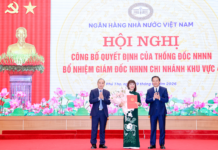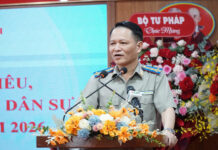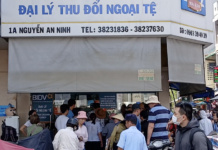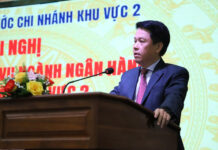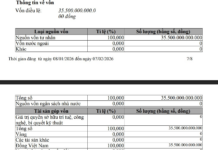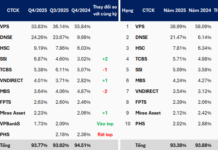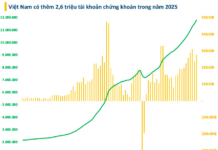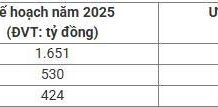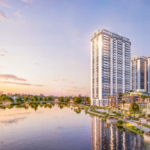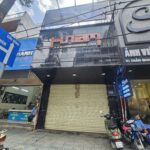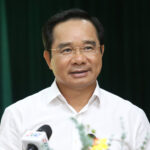The Task Force responsible for addressing issues related to land use rights certificates and property ownership certificates for commercial housing projects in Ho Chi Minh City has been recently restructured (Task Force 1645) and held its first meeting.
Several apartment projects have been reviewed by Task Force 1645 to resolve legal procedure bottlenecks, paving the way for the issuance of land use rights certificates and property ownership certificates (pink books).
However, numerous completed apartment buildings, where residents have been living for years, still lack these essential documents.
A prime example is Sky 9 apartment complex in Long Trường Ward, developed by Khang Việt National Housing Development JSC. Despite having 1,361 apartments and commercial service units, only 653 have received pink books.
The remaining units, along with 104 shophouses, are awaiting pink books due to the developer’s challenges in determining additional land use fees and fulfilling social housing obligations.
“While some residents in the same building have received their pink books, many of us, including myself, are still waiting. We urge authorities to expedite the process to protect residents’ rights,” shared a resident from Building D of Sky 9.
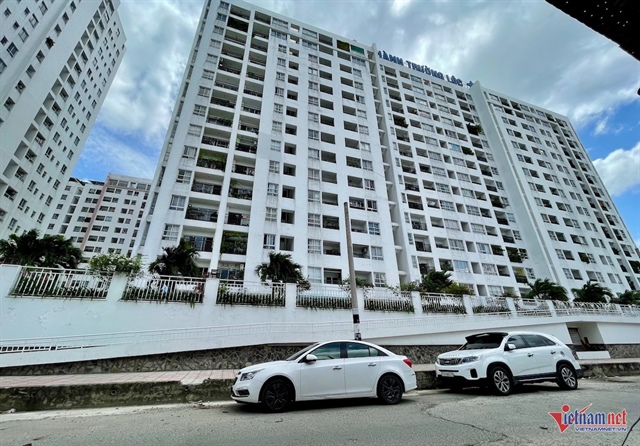
Apartments at 4S Riverside Linh Đông lacking pink books. Photo: Anh Phương |
Similarly, most units at 4S Riverside Linh Đông in Hiệp Bình Ward, developed by Thành Trường Lộc Construction LLC, remain without pink books. This complex, comprising four buildings with 1,114 apartments, was handed over to buyers in 2017.
A representative from Thành Trường Lộc stated that the land was acquired from NVT JSC. Approximately 10,000 m² designated for the apartment construction had its financial obligations fulfilled by NVT in 2007.
During the pink book application process, Thành Trường Lộc was instructed to pay an additional VND 4 billion, covering supplementary land use fees for over 5,000 m² and late payment charges.
During a meeting on September 16th, the Ho Chi Minh City Land Management Department advised Thành Trường Lộc to pay supplementary land use fees for the entire allocated land area, including public facilities. This would nearly double the payable area compared to the previously settled portion.
“Following this guidance, we estimate an additional payment of VND 3.5 billion for land use fees, plus VND 3.2 billion in late fees,” shared a Thành Trường Lộc representative, expressing hope for a fair and reasonable solution from authorities.
Many other Ho Chi Minh City apartments face similar issues. Thousands of units, where residents have lived for nearly a decade, lack pink books, including K26 (An Nhơn Ward), D’Vela (Phú Thuận Ward), 12View (Đông Hưng Thuận Ward), Him Lam (Bình Hưng Commune), and Nguyễn Tất Thành (Xóm Chiếu Ward) residential areas.
According to the Ho Chi Minh City Department of Agriculture and Rural Development, 87,500 out of 108,170 reviewed units across 176 projects have received pink books in the first eight months of the year. Over 20,000 units are still under review.
The department noted that most projects without pink books have complex legal issues, often related to financial obligations or ongoing inspections. Some are entangled in requirements to allocate 20% of land for social housing or resettlement.
Additionally, some projects lack pink books due to developers failing to complete infrastructure or violating construction regulations. The department emphasized the need for inter-agency collaboration to resolve these issues effectively.
Anh Phương
– 20:24 30/09/2025
Forging Revolutionary Partnerships: Ho Chi Minh City and China’s Leading Tech Hub Unveil Bold Collaboration Initiatives
Over time, the relationship and cooperation between the two parties have continued to strengthen and elevate to new heights.
Prime Location in Ho Chi Minh City: Establishing a Free Trade Hub
Leveraging the inherent advantages of the locale, the leadership of Saigon Ward has expressed a vision to establish several duty-free shopping centers. These hubs would primarily offer tax exemptions, reduced taxes, or permit transactions in foreign currencies, strategically designed to attract international visitors and bolster foreign currency inflows.






